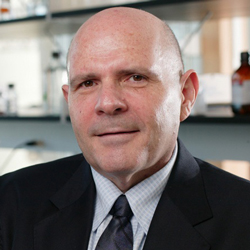Stupp Named to National Academy of Inventors
Samuel I. Stupp is among 148 new fellows in the 2018 class
Northwestern University professors Samuel I. Stupp and Elizabeth McNally have been named 2018 fellows of the National Academy of Inventors (NAI).
Election to NAI fellow status is a high professional distinction accorded to academic inventors who have demonstrated a prolific spirit of innovation in creating or facilitating outstanding inventions that have made a tangible impact on quality of life, economic development, and the welfare of society.
This year’s fellows will be inducted Thursday, April 11 at the Space Center Houston in Texas as a part of the NAI’s eighth annual meeting.
“I am very proud to welcome another class of outstanding NAI fellows, whose collective achievements have helped shape the future and who each day work to improve our world,” said Paul R. Sanberg, president of the NAI. “Each of these new NAI fellows embodies the Academy’s mission through their dedication, creativity, and inventive spirit. I look forward to working collaboratively with the new NAI fellows in growing a global culture of innovation.”
Stupp and McNally are among 148 new fellows in the 2018 class. The NAI has a total of more than 1,000 fellows, representing more than 250 research universities and government and nonprofit research institutions.
 Stupp is the Board of Trustees Professor of Materials Science and Engineering, Chemistry, Medicine, and Biomedical Engineering, with appointments in the McCormick School of Engineering, Weinberg College of Arts and Sciences, and Feinberg. He also directs the Simpson Querrey Institute and two of its research centers, the Center for Regenerative Nanomedicine and the Center for Bio-Inspired Energy Science.
Stupp is the Board of Trustees Professor of Materials Science and Engineering, Chemistry, Medicine, and Biomedical Engineering, with appointments in the McCormick School of Engineering, Weinberg College of Arts and Sciences, and Feinberg. He also directs the Simpson Querrey Institute and two of its research centers, the Center for Regenerative Nanomedicine and the Center for Bio-Inspired Energy Science.
Stupp’s research focuses on the molecular design of soft materials targeting novel functions for biomedical and energy technologies. One of his landmark achievements was the development of bioactive materials that can signal cells and be used in novel therapies for regenerative medicine. His work has led to the development of supramolecular biomaterials that mimic the natural structures surrounding cells in the human body and activate the necessary signals to initiate the growth of tissues and organs, such as bone, cartilage, muscle, and the spinal cord, among others. In the field of energy materials, Stupp has designed bio-inspired supramolecular materials to generate solar fuels, thus mimicking the photosynthetic machinery of plants, and soft materials with photovoltaic capacity to convert solar energy to electricity.
McNally is the Elizabeth J. Ward Professor of Medicine in the Feinberg School of Medicine, director of the Center for Genetic Medicine, and member of the Robert H. Lurie Comprehensive Cancer Center. Her team identifies and studies mechanisms of mutations that cause genetic diseases that affect the heart and muscles. McNally has conducted numerous studies, for example, to identify genes inherited in the development of cardiomyopathy and muscular dystrophy.
McNally aims to better understand how, when, and why these diseases develop and progress. To reach this goal, she has developed new tools to interpret rare genetic variants and works to identify modifiers of genetic disease, which are targets for developing new drugs. Her research also explores genetic correction technologies.
The National Academy of Inventors was founded in 2010 at the University of South Florida to recognize and encourage inventors with patents issued from the U.S. Patent and Trademark Office, enhance the visibility of academic technology and innovation, encourage the disclosure of intellectual property, educate and mentor innovative students, and translate the inventions of its members to benefit society. The NAI publishes the multidisciplinary journal, Technology & Innovation.